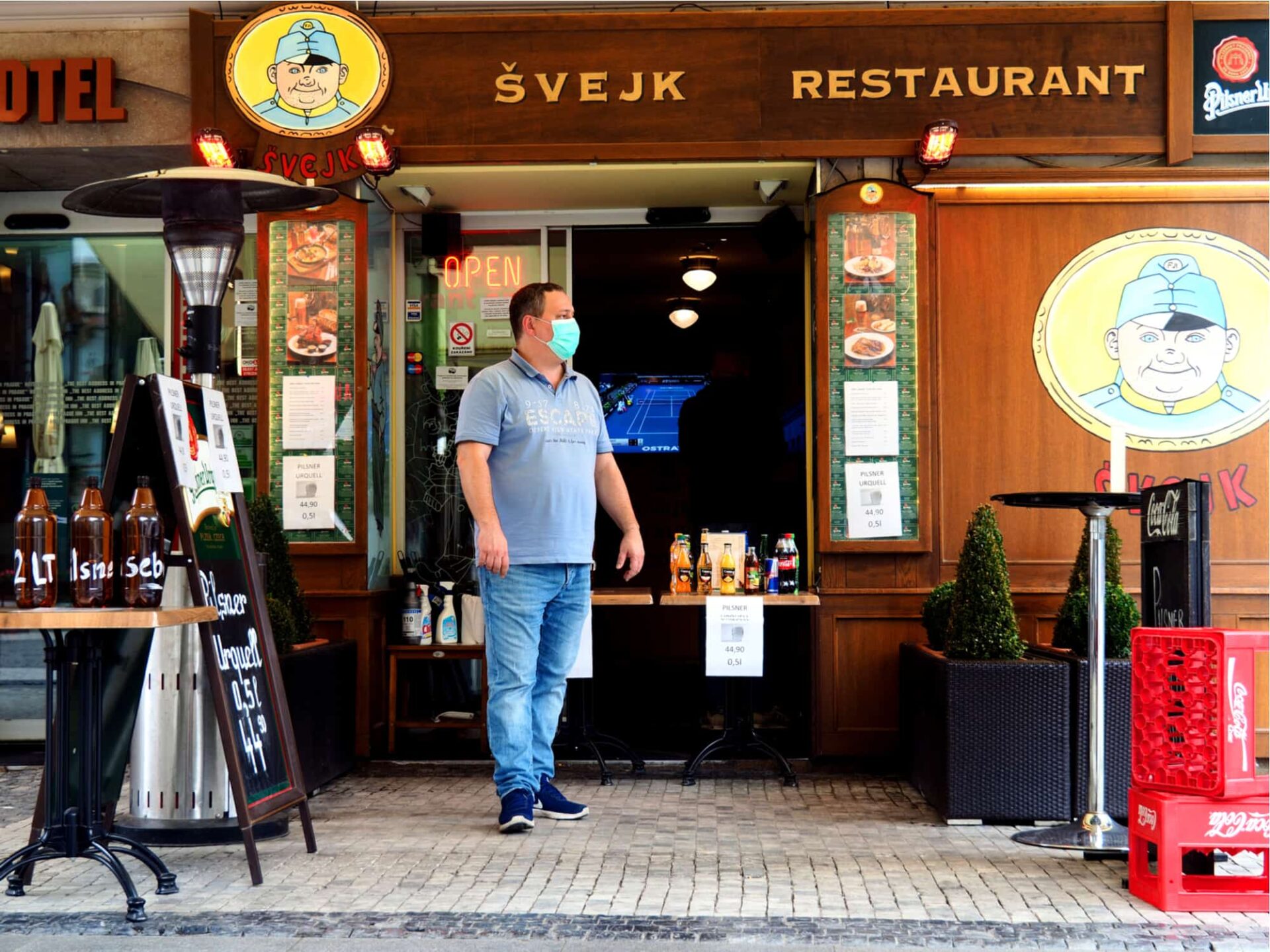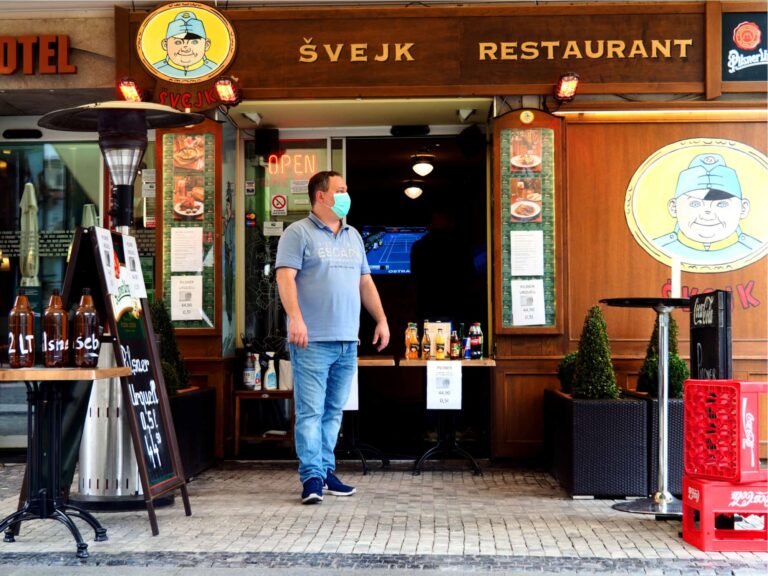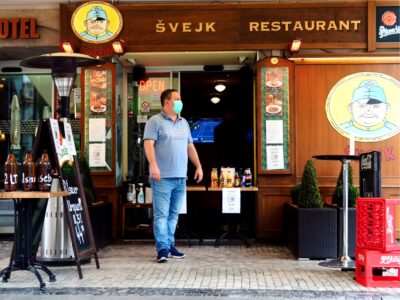Despite the celebration of “the end or the coronavirus crisis” in July, the Czech Republic is at the moment of writing the world’s most infected country per capita with around 15,000 people daily reported to have the virus.
On the first day of July, just over 3 months after the first COVID-19 infection was recorded in the Czech Republic, the famous Prague’s dominant Charles Bridge was packed with people. This would be hardly surprising under usual circumstances, but this time around, it was indeed quite extraordinary. Among them was a 500 metre long table prepared for a special dinner, as Czechs gathered to celebrate the end or the coronavirus crisis.
“We want to send a signal that we are alive and we are looking forward to all decent visitors to Prague who will come to see its beauties. This event will be unique, because it can be organized only thanks to this exceptional situation. Charles Bridge is almost empty, we may never experience such a thing again,” said the Mayor of Prague 1 district, Petr Hejma.
The Czech government decided to almost completely remove pandemic restrictions. Then Minister of Health Adam Vojtěch declared: “… we are releasing comprehensive measures and putting them on a local level. Wearing face masks indoors or in public transport will continue to be a matter for regions with high infection rates.”
Ninety-one COVID-19 positive cases were declared on the first of July. Face masks, which had helped to bond the Czech people during their spring fight against the pandemic, quickly disappeared – a measure which only later on was seen as a controversial decision. People smiled, drank and ate at the festive farewell-virus table – but the deadly virus was still there.
Mining the coronavirus
The first major COVID-19 outbreak appeared in the mining town of Karviná, located on the Polish border. The virus started spreading in late May, long before the summer restrictions break. But the government did not pay special attention to the region and, at the beginning of summer, three thousands of miners tested positive.
“We should not terrify each other. If we look at the situation in Karviná, obviously the increase is considerable , but it´s local. The opposition asked us [the government – editors note] about a plan. Our plan is to watch the daily data, the smart quarantine measures are working. We are constantly working on new mobile applications in case of a second wave of coronavirus. We should not be scared of the second wave, we are ready for it. (…) I don’t know what kind of plan the opposition is asking for. If there will be a higher number of infected people, we will react quickly, but it won’t be with any state-wide measures,” said the Prime Minister Andrej Babiš at his press conference in June.
The first regional cluster caught the authorities poorly prepared. The state-owned mining company OKD decided to halt production. Hundreds of positive cases appeared on the other side of the border in Polish mines. The opposition criticized the government for forgetting the region and not providing risk assessment for local outbreaks. „Karviná is paying for many failures in measures to fight the spread of coronavirus,” commented Zuzana Klusová, the member of opposition Pirates’ party.
The pause in mining was not enough and the virus spread quickly. The government applied sudden and strict measures across the whole region. The inhabitants of Karvina complained about insufficient and chaotic communication. “We do not know who is in quarantine and no one will tell us. Hygienists cannot tell us, so there is no control,” explained the spokesman of town Karviná Lukáš Hudeček. Around 2000 people went to streets to protest against the measures and they asked the Health Minister Vojtěch to resign. He declined.
A little party never killed nobody
The miners’ region crisis was not yet handled when another severe outbreak appeared. After an evening in a Prague night club almost two hundred people ended up with COVID-19 infection. The suspected so-called patient zero was a girl who got fever the next day and tested positive. As she only knew a few people from the party crowd she was not able to contribute with the tracing of the others.
The state hygiene office failed to trace the contacts. She decided to search them by herself, and as a result she could not remain anonymous. Czech media arranged several interviews with her, in which she explained the consequences of being honest and tracing the contacts by herself. Members of the public threatened her and insulted her on social media.
“Smart quarantine is working,” declared Adam Vojtěch in Czech Television, when he was asked to comment on the spreading of the disease. But infected people complained that the “smart quarantine” was anything but working and that tracing of contacts is done poorly and slowly. People have been informed that they could be infected a week after the encounter.
“It is still true that we do not want to take drastic measures like in the spring of this year. I personally recommend wearing face masks in places with a greater concentration of people and also avoiding mass events,” the minister Vojtěch said at the press conference at the end of July.
The consequence of the night club event was a return to the obligation of wearing face masks indoors in places with more than 100 people.
No Czech summer without Croatian sunshine
“I am looking into the crystal ball and I see that I must go on a vacation. They say I am unbearable and I have to leave. So I am going on holidays, but I can see all the good things for our country,” joked the Prime Minister Andrej Babiš on his Youtube channel. Later he explained that the government will take a summer break.
Just like the leader of the country, many Czechs left to enjoy their annual holiday destinatination – the Croatia sea. The number of infected people there was increasing and on the third week of August reached almost 1700 infections on the Adriatic coast. Several European countries then decided to categorize Croatia as a high risk country.
Čau lidi. Koukám do křišťálové koule a vidím, že musím na dovolenou. Všichni kolegové říkají, že už jsem nesnesitelný a mám vypadnout. Nevím, jak na to přišli. Tak jedu ? Tady poslední hlášení. A ta koule je z Moseru ? https://t.co/AYezLUQWNp
— Andrej Babiš (@AndrejBabis) August 1, 2020
Meantime, Andrej Babiš came back immediately after the “government break” when the coronavirus crisis took a serious turn. The minister of Health Adam Vojtěch announced obligatory face masks for school kids, starting from the 1st of September.
“I am shocked by what the Minister of Health said. I don’t like that at all,” said the Prime Minister in Czech Radio. Babiš said that schools were still a subject of discussion. Vojtěch then changed the measure as Babiš anticipated, bending to his will. Vojtěch was highly criticized for chaotic communication and sudden changes in the rules.
Few days later, Andrej Babiš was interviewed by three different media. One of these was for the publisher owned by the Prime Minister’s trust fund.
When Babiš was asked by a reporter as to why he wears a face mask himself, but he doesn’t issue a measure of wearing face masks compulsory for all, he said he wanted to leave people “free to decide”.
“At the same time, however, we must do everything we can to protect health and to create a system that allows for freedom of choice. We agree that the elderly should protect themselves, but we should not always give orders. We just need to get back to normal life before the virus,” he added.
Elections’ wooing
In fact, masks were made compulsory again on the first September, but in a restricted way. “We will introduce wearing face masks only in the most epidemiologically risky areas. However, we recommend them wherever there are many people moving and it is not possible to maintain safe distance,” explained Vojtěch at the press conference.
At the same time the chief hygienist Jarmila Rážová mentioned that there was an upward trend of COVID-19 positive cases in Prague. According to her, there was no need to apply strict epidemiologic measures yet. But she also highlighted that a community spreading with unknown sources is more common and asked Prague´s inhabitants to act responsibly. A few days later, despite the rising infections, the government increased the number of participants allowed at events.
On the 8th of September, the number of newly infected people in the country broke the 1000 a day mark for the first time. Since that point, the curve has rapidly grown and the government has reacted quickly. Immediately, face masks were again made obligatory indoors. Ten days later, the Czech Republic reached a new record with more than 2000 positive people. Public events were limited from hundreds to 10 people only.
“I decided to resign. I have already delivered my resignation letter to the Prime Minister,” announced Adam Vojtěch at the press conference, in response to the situation in the country.
The Prime Minister addressed the nation in a special 10-minute-speech on the television, where he admitted that relaxing of the protective measures during the summer was a mistake. He asked people to be responsible and tolerant towards sick and old people. He also mentioned he doesn’t want to endanger the country’s economy and he was trying to find the balance between health and the economy. The opposition dubbed the speech a marketing tool before upcoming elections.
In early October, Czech people came to the polls to vote for regional elections. The leading party ANO again won, but the party lost few important regions.
“I would like to thank everyone who came to the polls. It’s amazing that they weren’t afraid of COVID at this time. I think it’s a great result. I admit, I was worried about it, because of criticism of our government. That is why I appreciate the result immensely, ” the Prime Minister Babiš said at the conference.
The Czech Republic is at the moment of writing the world’s most infected country per capita with around 15,000 people daily reported to have the virus.
Eva is a journalist working for investigace.cz based in Prague. Investigace.cz is NGO covering organized crime topics and the only Czech partner of OCCRP. She works on projects connected to Slovakia.






